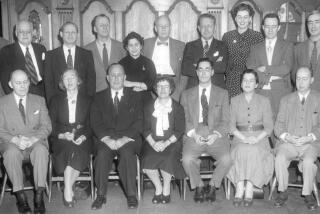BOOK REVIEW : Reflections From 50 Years in Science : FROM EROS TO GAIA, <i> by Freeman Dyson,</i> Pantheon, $25, 372 pages
Freeman Dyson, professor of physics at the Institute for Advanced Study in Princeton, is a gifted writer concerned with the role of science in our common human destiny.
A British-born naturalized American, Dyson had earlier recounted his own scientific history in a splendid autobiography, “Disturbing the Universe.” But while an autobiography by definition filters events through the time in which it is written, this collection of literary fragments, articles, book reviews and talks written over 50 years is what historians call “source material.”
Organized chronologically within topical chapters, “From Eros to Gaia” reflects how Dyson thought about space travel as it became a reality, about nuclear fission as the arms race heated up, and how he pondered the structure of scientific research in projects as wide-ranging as the VLA (the giant radio telescope in New Mexico) and human genome mapping.
“From Eros to Gaia” echoes several themes, the first of which appears in a chapter titled “Cautionary Tale for Scientists.”
Here Dyson recalls how his daughter, a Peace Corps volunteer in Central Africa, observed attempts to supply water to a Boulou village in Cameroon. The villagers had two choices: They could hire a local, professional well digger to design and construct a well, bathhouse and laundry using local workers, or they could submit a competitive proposal to the distant central government requesting a massive water system using urban technology.
The Boulou opted for the latter, attracted to the long-shot chance of enormous bounty, and repulsed by the former proposal, which meant working for a well-digger from the Fulami, a low-status group from whom the Boulou were loath to take orders. Reportedly, the Boulou still have no water supply.
Dyson runs across this kind of Boulou decision-making--wherein the hunger for prestige eclipses the cause of science--across the globe. He recounts how an observatory was built at Zelenchuskskaya, in the Caucasus Mountains of the former Soviet Union.
Here the Boulou faction won again--the observatory was built on a notoriously fog-shrouded mountain. But the observatory’s huge visitor’s gallery and white wall on which visitors could write their names was a great public relations coup.
At home, Dyson finds Boulou decision-making in projects like the space shuttle and the SSC (the Superconducting Supercollider), decisions that are politically popular but scientific duds.
Dyson’s second theme is “the roads not taken”: scientific projects that either stayed on the drawing boards or got some funding but never enough to be taken seriously.
It seems that in 1953, Wernher von Braun published a book proposing the Mars Project, a plan using what was essentially World War II military technology and methodology to explore the surface of Mars with at least 70 astronauts and a fleet of 10 spaceships and 46 space ferries or shuttles that would bring samples back to Earth.
Of course, Von Braun did not envision that data could be sent back to Earth directly, immediately and more economically by computerized imagining. Dyson regrets the Mars Project, but admits that it was never taken seriously. Sadder for him was the scrapping of Orion. This was a space vehicle designed in the late 1950s that would have been propelled by repeatedly exploding nuclear bombs.
Dyson views Orion with nostalgia and alludes to a dream among the scientists who created nuclear bombs that the same weapons which killed and maimed at Hiroshima and Nagasaki would some day “open the skies to mankind.”
Dyson draws lessons from these ventures, the first of which is the importance of waste. He laments the effects of budgets so tight that there is no leeway for false starts. He asserts that waste is basic to change and cites as a model biological evolution which is full of waste--dead ends and leftover vestigial organs.
Linked to the pressure to avoid waste is the problem of “premature choice.” Dyson uses the space shuttle as an example of the pitfall of “betting all your money on one horse before you have found out whether she is lame.”
On another level, Dyson discusses the time it takes to assimilate new, fundamental scientific ideas. He marvels that concepts like quantum mechanics, understood by only a handful of people a generation ago, are now part of all physicists’ working tools. Our ability to assimilate new ways of understanding surely fuels his underlying optimism.
Dyson’s thoughtful voice is never arrogant and often more modest than his considerable accomplishments merit. Ever astonished and delighted by nature, he echoes the biologist J. B. S. Haldane, who cautioned that “the universe is not only queerer than we suppose, but cleaner than we can suppose.”
More to Read
Sign up for our Book Club newsletter
Get the latest news, events and more from the Los Angeles Times Book Club, and help us get L.A. reading and talking.
You may occasionally receive promotional content from the Los Angeles Times.






